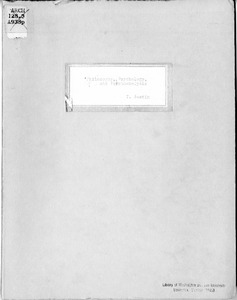Philosophy, Psychology, and Psychonalysis

View/
Author
Austin, Terry Gardner
Subject
Philosophy
Psychology
Psychoanalysis
Metadata
Show full item recordDescription
The title page indicates that this paper is a thesis for the course, Philosophy 296. The problem remains: how is the essential nature of man to be dealt with without falsifying that essential nature in the process. "Man" as defined by the transcendental nature of thought versus a finite, individual , human being; and mind versus body as comparable categories of objects existing through time to be objectively investigated: these are the distinctions which must be dealt with if we are to approach the problem of a methodology for philosophy and psychology which is appropriate to man as a being which has the capacity to think or is implicitly self-conscious. These dualistic distinctions are first apparent in the writings of Plato, proceed through the Neoplatonist thought of Saint Augustine as he attempts to reconcile introspection and revelation, and are most clearly apparent in the work of Rene Descartes. Let us begin then an analysis of the thought of the latter two in hope of extracting significant contributions toward a proper methodology of investigating man's consciousness and exposing as inadequate those arguments which lead to anything contrary thereof. [From Introductory section]